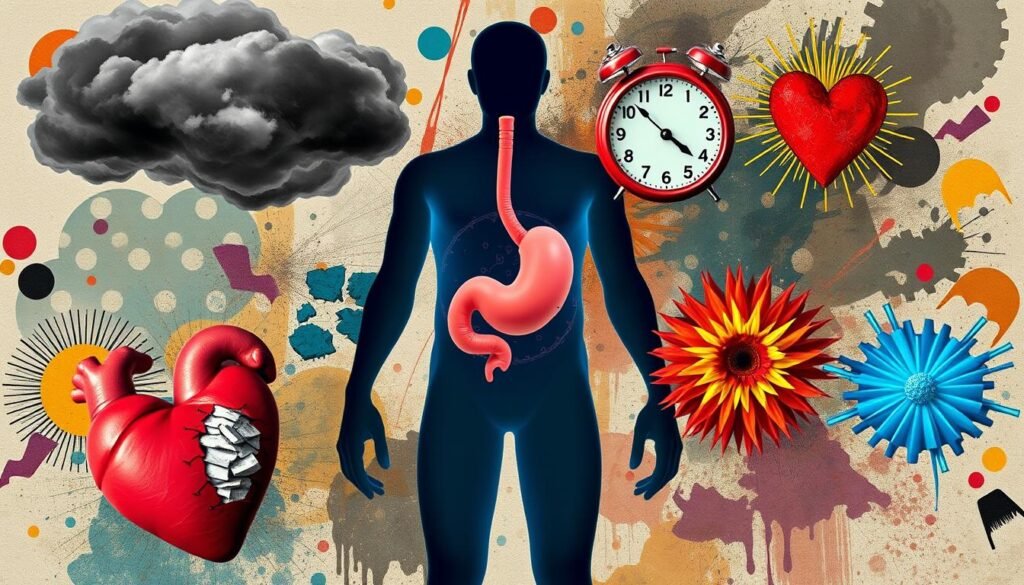Did you know? In Europe, over 30,000 adverse effects from GLP-1 medicines have been reported. Only 1.2% are psychiatric, with 0.5% about anxiety. This shows a growing concern for the mental impacts of drugs like Ozempic.
Ozempic, first used for Type 2 diabetes, is now a popular weight loss shot. But, its rise has led to more users reporting anxiety and mental health issues. It’s key to look at Ozempic’s effects on both body and mind. As we learn more, it’s vital to know how Ozempic could affect your mental health.
Key Takeaways
- Ozempic anxiety is a growing concern among users of the medication.
- A small percentage of adverse event reports are psychiatric-related.
- Weight loss injections like Ozempic may have both physical and psychological side effects.
- Understanding personal medical histories is essential when prescribing GLP-1 medications.
- Further investigations are needed to assess the potential link between Ozempic and mental health issues.
- Monitoring diabetes medication anxiety is crucial for managing overall health.
Introduction to Ozempic and Its Uses
Ozempic contains semaglutide, a medicine for managing Type 2 diabetes. It’s a GLP-1 receptor agonist. This means it helps boost insulin release and slows down digestion, making you feel full longer. These effects help control blood sugar levels effectively.
Recently, people have started using Ozempic for weight loss too. This off-label use has gained popularity because it addresses both diabetes and obesity. However, using it for weight management brings up important health considerations, especially about mental health.
There have been reports of users feeling anxious or depressed. It’s important to closely examine these experiences. This will help us understand all the ways Ozempic can affect a user’s health, not just their blood sugar.
Understanding Ozempic: Mechanism of Action
Ozempic works by dealing with your body’s biological processes. It mainly impacts how blood sugar and appetite are controlled. As a GLP-1 receptor agonist, Ozempic (semaglutide) boosts insulin when blood sugar goes up. This is especially important for those with diabetes, as it helps manage their blood sugar levels better.
Semaglutide also plays a key part in reducing hunger. It makes people feel fuller, reducing the need to eat more. By doing so, Ozempic supports weight management and ties into the body’s metabolic processes for healthier weight loss.
Ozempic’s effects are not just on the body but also on the mind. Studies are exploring how it might influence our moods and feelings related to eating. By understanding how Ozempic can affect hunger, satisfaction, and even happiness, we get insight into its broader impacts. This is crucial for those using Ozempic, not just for physical health but for mental well-being too.
Ozempic Anxiety: Reports and Concerns
More people are using Ozempic, and many report feeling anxious. They feel emotionally unstable while on the medication. These experiences, from mild unease to deep anxiety, raise questions about how this GLP-1 drug affects the mind.
Patient Experiences with Ozempic and Anxiety
Many on Ozempic face mental health issues. They often deal with nausea and vomiting. These side effects harm their mental well-being.
The link between physical pain and mental health is clear. Some people feel less happy and more anxious. These feelings can come on suddenly, sparking concern about the medication’s impact on mental health.
Research Findings on Mental Health and Ozempic
Research shows mixed effects of GLP-1 drugs on mental health. A European study found many cases of psychiatric events, including anxiety. Yet, some studies suggest GLP-1 drugs may lower the risk of wanting to harm oneself compared to other weight-loss drugs.
This reveals a complicated picture of how Ozempic affects mental health. It’s key for doctors to understand these potential effects. That way, they can better help those taking the medication.
Ozempic Side Effects: What to Expect
Ozempic is a drug used to control type 2 diabetes, but it has side effects. It’s important for patients to know about these. Knowing about common physical side effects and psychological side effects helps in making good choices.
Common Physical Side Effects
Many people using Ozempic face certain physical side effects. Here’s a list of what happens most often:
- Nausea
- Vomiting
- Diarrhea
- Abdominal pain
- Constipation
Some serious side effects include pancreatitis, with severe stomach pain, and potential kidney issues. Low blood sugar is another risk, more so when mixing Ozempic with other diabetes drugs. So, it’s crucial for patients to watch out for these ozempic side effects.
User Reports of Psychological Side Effects
There are also psychological effects from Ozempic to consider. Users have shared experiences such as:
- Anxiety
- Mood swings
- Irritability
- Shakiness
- Confusion
Being aware of these mental health issues is key. Though Ozempic helps with weight and diabetes management, the mental impact matters too. Having regular check-ups and discussing ozempic side effects with doctors helps in taking care of both physical and mental health properly.

Exploring the Connection Between GLP-1 Medications and Mental Health
GLP-1 medications like semaglutide and liraglutide are popular for managing Type 2 diabetes and helping with weight loss. However, their impact on mental health is not well-studied. Early studies in animals found that these medications might cause anxiety initially but could improve mood with long-term use.
A clinical trial with liraglutide brought up some concerns. Participants reported more thoughts of suicide. The European Medicines Agency (EMA) is looking into this link closely. They’re reviewing data on semaglutide and liraglutide to better understand the risks.
One case of a 54-year-old patient on semaglutide was particularly insightful. The patient became depressed and had trouble sleeping after four weeks. Stopping the medication helped improve their mood. This suggests a link between semaglutide and poor mental health.
In 2023, the EMA began investigating after 150 self-harm and suicide reports related to semaglutide. At the same time, the FDA found nearly 500 cases of anxiety or depression in patients using semaglutide. This includes 96 reports of suicidal thoughts. These findings are part of the ongoing discussion on the ozempic mental health effects.
Research has shown mixed results. While some patients might face psychiatric symptoms, other studies found no significant mental health issues with GLP-1 medications. Yet, higher doses, like those in Wegovy, may increase risks of anxiety, depression, and suicidal thoughts. This is concerning.
Understanding how GLP-1 medications affect mood and mental health is complex. More thorough studies are necessary, especially for those with existing psychiatric conditions. Answering these questions will help guide both patients and doctors in making informed decisions.
| Study | Findings |
|---|---|
| Rodent Study | Anxiety onset followed by positive mood effects with chronic treatment. |
| Liraglutide Trial | Slight numerical imbalance in suicidal ideation reports. |
| EMA Investigation | 150 reports of self-harm linked to semaglutide. |
| FDA Reports | 489 anxiety and depression cases related to semaglutide. |
Diabetes Medication Anxiety: The Overlap with Ozempic
People with diabetes often face many challenges. Diabetes medication anxiety is common when starting treatments like Ozempic. This worry comes from dealing with a long-term illness and side effects of medicines. The FDA got 489 reports of anxiety, depression, or suicidal thoughts linked to semaglutide, which is in Ozempic. Out of these, 96 patients had thoughts of suicide, raising concerns about the mental effects of these medications.
A study in JAMA Internal Medicine found no big difference in mental health scores between those on semaglutide and those not. Yet, it’s crucial to keep watching how patients are doing. Starting a new treatment like Ozempic can be hard for those already struggling with mental health. Ozempic can cause fast weight loss, which might change how people cope and interact with others.
The link between ozempic mental health and daily life is complex. There’s no strong proof that Ozempic directly causes more anxiety or depression. However, GLP-1 medications, which include Ozempic, can change neurotransmitter activity. This affects hunger and can also change mood by altering dopamine and serotonin levels.
Weight management might improve how people feel about themselves. But, it’s important to talk about the mental side effects of weight loss and medication anxiety. Users should talk with their doctors about any mood changes. Discussing these feelings is an important step in treatment.
It’s very important to handle stress and make healthy lifestyle choices for both mental and physical health. Regular exercise, good sleep, and mindfulness can help lessen negative medication effects. For tips on handling stress better, check out these stress management techniques. They can help make dealing with diabetes medication easier.

Weight Loss Injection Anxiety: Addressing Patient Concerns
Many patients using weight loss injections like Ozempic face anxiety. This comes from body and lifestyle changes. The term weight loss injection anxiety includes worries about diet, fast body changes, and weight loss views. Knowing the psychological effects during weight loss is key for patients and doctors.
Psychological Effects Observed During Weight Loss
Starting weight loss drugs can bring emotional challenges. A 2012 study showed that while old weight loss methods often have short-term results, medicines like GLP-1 can improve mental health. Users felt better about themselves and had fewer signs of depression. This shows the varied reactions people may have.
In 2023, research in Brain Sciences looked at social media posts from users of weight loss drugs. Many mentioned feeling more anxious, depressed, and having trouble sleeping soon after starting the medication. It’s important for doctors to watch for these issues, especially in those with past eating disorders. Drugs like Ozempic could make eating problems worse.
The mental side of weight loss drugs is important and can’t be ignored. Watching for signs of emotional trouble in those starting these medicines is crucial. This helps keep them safe on their weight loss path. Patients and doctors should talk openly about possible psychological effects during weight loss. This helps create a caring support system.
| Study Year | Findings |
|---|---|
| 2012 | Positive psychological benefits of GLP-1 medications over traditional methods. |
| 2014 | Significant improvements in mental health from weight loss interventions. |
| 2023 | Reports of anxiety and depression from weight loss medication users. |
Knowing these things helps in managing expectations and dealing with concerns. This makes the journey to weight management healthier.
Managing Ozempic-Induced Anxiety
Ozempic may cause anxiety in some people. It’s important to find ways to lessen this anxiety. Two main ways include talking to healthcare providers and watching your blood sugar.
These steps help you understand your treatment options. They also show what triggers your anxiety.
Consulting Healthcare Providers
Talking to healthcare providers is key in dealing with Ozempic anxiety. An open chat about side effects might lead to changes in your treatment. They can also tell you how this medication affects your mental health.
Address any mood or anxiety changes with them. Regular visits make sure your worries are quickly looked at and managed.
Tracking Blood Sugar Levels
Knowing how food, activity, and Ozempic mix is key to managing anxiety. Keeping track of blood sugar can ease worries about using Ozempic. For those with type 2 diabetes, changes in blood sugar can make you feel stressed.
By checking these levels, you can find patterns and triggers of anxiety. This helps in making a plan to deal with it better.
Comparing Ozempic with Other Anti-Obesity Medications
Comparing ozempic to other anti-obesity medications is key for those looking at weight management options. Numerous studies show the outcomes of different drugs like semaglutide, tirzepatide, and more. One study with over 100 million patient records in the USA focused on over 20,000 patients using semaglutide, including Ozempic and Wegovy. This drug helped people lose about 15% to 16% of their weight. Mounjaro showed even better results, with 20% to 22% weight loss. Future medications might achieve up to 24% to 25% weight loss.
Different meds have different side effects. For injections like Wegovy, problems can include upset stomach, heartburn, and diarrhea. Pills like Contrave might cause headaches, sleep issues, and upset stomach. Usually, people see at least a 5% weight loss in three months. With Mounjaro, some could lose up to 20%.
Studies have also looked at how these meds affect mental health. Semaglutide carried a lower suicide thought risk compared to others for diabetes and obesity. Those with past suicidal thoughts had fewer when taking semaglutide. So, mental health impacts are crucial to think about when picking a medication.
| Medication | Average Weight Loss | Common Side Effects | Risk of Suicidal Ideation |
|---|---|---|---|
| Ozempic/Wegovy (Semaglutide) | 15% – 16% | Nausea, heartburn, diarrhea | Lower risk |
| Mounjaro (Tirzepatide) | 20% – 22% | Nausea, gastrointestinal issues | Lower risk |
| Contrave | 10% (combined with diet/exercise) | Headaches, insomnia, nausea | Varies |
When looking at anti-obesity drugs, it’s vital for patients to think about the pros and cons of each. The ozempic comparison shows the need for care plans that match each patient’s needs.
Recommendations for Coping with Ozempic Anxiety
Coping with Ozempic anxiety can really affect a patient’s well-being. Managing stress and living healthy are key. They help reduce anxiety symptoms. Taking charge helps deal with emotions and manage health better.
Stress Management Techniques
Using stress management techniques can improve mental health. Here are a few to try:
- Mindfulness Meditation: Mindfulness keeps your thoughts centered and lowers anxiety.
- Deep Breathing Exercises: Deep breathing helps calm the body and fights stress.
- Cognitive Behavioral Therapy (CBT): Therapy offers ways to handle anxiety and emotional issues.
- Journaling: Writing about your feelings can help clear your mind and be a way to release emotions.
Healthy Lifestyle Habits to Consider
It’s important to adopt healthy habits for your mind and body. Here are habits you should add to your daily life:
- Balanced Nutrition: A balanced diet supports both mental and physical health.
- Regular Exercise: Exercise releases endorphins, easing stress.
- Quality Sleep: Good sleep helps with managing emotions and staying strong.
- Social Support: Having support from friends and family makes you feel less alone.

It’s important to deal with weight and body image issues. Handling how society views us helps lessen social anxiety. Using these techniques and habits can support those with Ozempic anxiety. It leads to a healthier approach to managing health.
Understanding the Regulatory Perspective
The world is watching as Ozempic undergoes close safety and effectiveness checks. The FDA has a big job: watching how it impacts mental health. U.S. and European regulators are working hard. They make sure the benefits of Ozempic outweigh the risks.
FDA Reviews and Guidelines on Ozempic
Recently, the FDA has been busy with reports of bad reactions to Ozempic. Out of 489 reports, many mention anxiety, depression, or even suicidal thoughts. Depression showed up in 50.3% of these cases, and anxiety made up 38.7%. This has made experts take a closer look. The regulatory view on Ozempic now includes paying attention to these mental health effects.
The FDA also warns about risks during surgery. Plus, the review of 1,300 lawsuits is putting a spotlight on Ozempic’s impact on mental health. This includes cases of suicidal thoughts.
The European Medicines Agency is also concerned, looking into over 150 cases of harmful thoughts linked to the drug. The push for better FDA rules grows as more studies and lawsuits provide new info on GLP-1 agonists.
Improving FDA rules is key for keeping Ozempic users safe from psychiatric dangers. Keeping doctors and patients talking is very important for drug safety.
Conclusion
Ozempic affects both body and mind, showing it’s more than just a diabetes treatment. People around the world face anxiety. The link between using Ozempic and feeling anxious varies among users. While some feel more anxious, others see an emotional boost from better diabetes control. This situation underlines the need for understanding the side effects discussed in managing side effects.
Studies point to a hopeful connection: better sugar control might mean less anxiety for diabetic patients. The role of GLP-1 receptor agonists, like Ozempic, in reducing anxiety is still being explored. Yet, with over 600 reports of mental health issues in 2023 alone, it’s clear that patient and doctor must talk openly about potential mental side effects.
For those dealing with ozempic anxiety, talking to healthcare providers is key. Sharing concerns and finding ways to handle side effects can strengthen treatment. This approach helps patients take charge of their health, leading to better overall well-being with Ozempic.